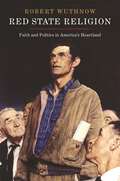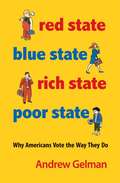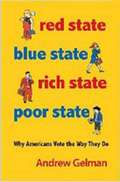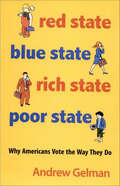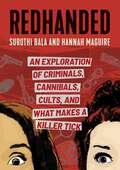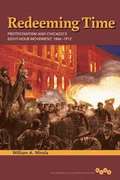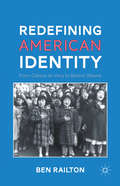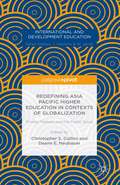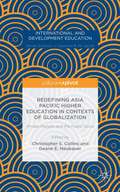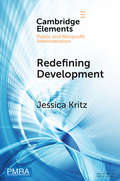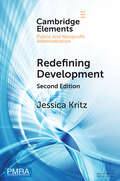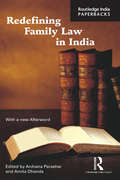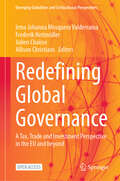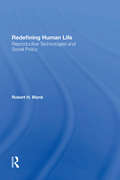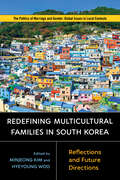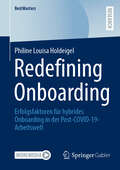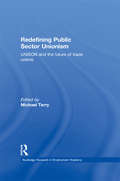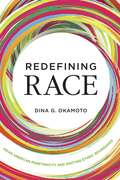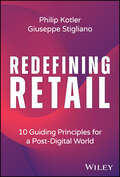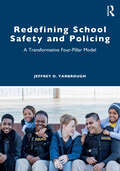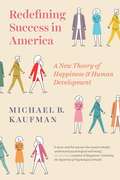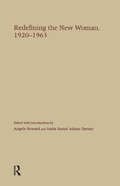- Table View
- List View
Red State Religion: Faith and Politics in America's Heartland
by Robert WuthnowWhat Kansas really tells us about red state AmericaNo state has voted Republican more consistently or widely or for longer than Kansas. To understand red state politics, Kansas is the place. It is also the place to understand red state religion. The Kansas Board of Education has repeatedly challenged the teaching of evolution, Kansas voters overwhelmingly passed a constitutional ban on gay marriage, the state is a hotbed of antiabortion protest—and churches have been involved in all of these efforts. Yet in 1867 suffragist Lucy Stone could plausibly proclaim that, in the cause of universal suffrage, "Kansas leads the world!" How did Kansas go from being a progressive state to one of the most conservative?In Red State Religion, Robert Wuthnow tells the story of religiously motivated political activism in Kansas from territorial days to the present. He examines how faith mixed with politics as both ordinary Kansans and leaders such as John Brown, Carrie Nation, William Allen White, and Dwight Eisenhower struggled over the pivotal issues of their times, from slavery and Prohibition to populism and anti-communism. Beyond providing surprising new explanations of why Kansas became a conservative stronghold, the book sheds new light on the role of religion in red states across the Midwest and the United States. Contrary to recent influential accounts, Wuthnow argues that Kansas conservatism is largely pragmatic, not ideological, and that religion in the state has less to do with politics and contentious moral activism than with relationships between neighbors, friends, and fellow churchgoers.This is an important book for anyone who wants to understand the role of religion in American political conservatism.
Red State, Blue State, Rich State, Poor State: Why Americans Vote the Way They Do
by Andrew Gelman David ParkOn the night of the 2000 presidential election, Americans watched on television as polling results divided the nation's map into red and blue states. Since then the color divide has become symbolic of a culture war that thrives on stereotypes--pickup-driving red-state Republicans who vote based on God, guns, and gays; and elitist blue-state Democrats woefully out of touch with heartland values. With wit and prodigious number crunching, Andrew Gelman debunks these and other political myths. This expanded edition includes new data and easy-to-read graphics explaining the 2008 election. Red State, Blue State, Rich State, Poor State is a must-read for anyone seeking to make sense of today's fractured political landscape.
Red State, Blue State, Rich State, Poor State: Why Americans Vote the Way They Do
by Jeronimo Cortina Andrew Gelman David Park Boris ShorOn the night of the 2000 presidential election, Americans sat riveted in front of their televisions as polling results divided the nation's map into red and blue states. Since then the color divide has become a symbol of a culture war that thrives on stereotypes--pickup-driving red-state Republicans who vote based on God, guns, and gays; and elitist, latte-sipping blue-state Democrats who are woefully out of touch with heartland values. Red State, Blue State, Rich State, Poor Statedebunks these and other political myths. With wit and prodigious number crunching, Andrew Gelman gets to the bottom of why Democrats win elections in wealthy states while Republicans get the votes of richer voters, how the two parties have become ideologically polarized, and other issues. Gelman uses eye-opening, easy-to-read graphics to unravel the mystifying patterns of recent voting, and in doing so paints a vivid portrait of the regional differences that drive American politics. He demonstrates in the plainest possible terms how the real culture war is being waged among affluent Democrats and Republicans, not between the haves and have-nots; how religion matters for higher-income voters; how the rich-poor divide is greater in red not blue states--and much more. Red State, Blue State, Rich State, Poor Stateis a must-read for anyone seeking to make sense of today's fractured American political landscape. Myths and facts about the red and the blue:Myth: The rich vote based on economics, the poor vote "God, guns, and gays. " Fact: Church attendance predicts Republican voting much more among rich than poor. Myth: A political divide exists between working-class "red America" and rich "blue America. " Fact: Within any state, more rich people vote Republican. The real divide is between higher-income voters in red and blue states. Myth: Rich people vote for the Democrats. Fact: George W. Bush won more than 60 percent of high-income voters. Myth: Religion is particularly divisive in American politics. Fact: Religious and secular voters differ no more in America than in France, Germany, Sweden, and many other European countries.
Red State, Blue State, Rich State, Poor State: Why Americans Vote the Way They Do
by Andrew GelmanOn the night of the 2000 presidential election, Americans watched on television as polling results divided the nation's map into red and blue states. Since then the color divide has become symbolic of a culture war that thrives on stereotypes--pickup-driving red-state Republicans who vote based on God, guns, and gays; and elitist blue-state Democrats woefully out of touch with heartland values. With wit and prodigious number crunching, Andrew Gelman debunks these and other political myths. This expanded edition includes new data and easy-to-read graphics explaining the 2008 election. Red State, Blue State, Rich State, Poor State is a must-read for anyone seeking to make sense of today's fractured political landscape.
Red-Hot and Righteous: The Urban Religion of The Salvation Army
by Diane WinstonIn this engrossing study of religion, urban life, and commercial culture, Diane Winston shows how a (self-styled "red-hot") militant Protestant mission established a beachhead in the modern city. When The Salvation Army, a British evangelical movement, landed in New York in 1880, local citizens called its eye-catching advertisements "vulgar" and dubbed its brass bands, female preachers, and overheated services "sensationalist." Yet a little more than a century later, this ragtag missionary movement had evolved into the nation's largest charitable fund-raiser--the very exemplar of America's most cherished values of social service and religious commitment. Winston illustrates how the Army borrowed the forms and idioms of popular entertainments, commercial emporiums, and master marketers to deliver its message. In contrast to histories that relegate religion to the sidelines of urban society, her book shows that Salvationists were at the center of debates about social services for the urban poor, the changing position of women, and the evolution of a consumer culture. She also describes Salvationist influence on contemporary life--from the public's post-World War I (and ongoing) love affair with the doughnut to the Salvationist young woman's career as a Hollywood icon to the institutionalization of religious ideals into nonsectarian social programs. Winston's vivid account of a street savvy religious mission transformed over the decades makes adroit use of performance theory and material culture studies to create an evocative portrait of a beloved yet little understood religious movement. Her book provides striking evidence that, counter to conventional wisdom, religion was among the seminal social forces that shaped modern, urban America--and, in the process, found new expression for its own ideals.
RedHanded: An Exploration of Criminals, Cannibals, Cults, and What Makes a Killer Tick
by Suruthi Bala Hannah Maguire2021 Listeners' Choice British Podcast Awards WinnerWhat is it about killers, cult leaders, cannibals, cults, and criminals that capture our imaginations even as they terrify and disturb us?How do we responsibly consume these kinds of stories as entertainment, and more importantly, what can we learn from them? RedHanded rejects the narrative of killers as monsters and that a victim "was in the wrong place at the wrong time," and instead tells the stories we want to hear in a way that challenges perceptions and asks the hard questions about society, gender, poverty, culture, and even our politics.After meeting at a party in London where they both discovered they listened to the same murder podcasts, Hannah Maguire and Suruthi Bala drunkenly promised to one day start their own true crime podcast together and the rest is history. From the hosts of the hit true crime podcast RedHanded (dubbed by Rick & Morty creator Dan Harmon as the "best true crime podcast I've heard, ever"), Hannah Maguire and Suruthi Bala have amassed a cult following of "spooky bitches" amounting to an incredibly strong 63k downloads per episode and 728k backlist downloads every month in the US alone.With candor, humor, interviews with experts, research on real-life cases, and an unflinching dissection of what makes a killer tick, Bala and Maguire take us through the societal, behavioral, and cultural phenomena that make victims -- and their murderers -- our collective responsibility and to find out once and for all: what makes a killer tick?
Redeeming Time: Protestantism and Chicago's Eight-Hour Movement, 1866-1912
by William A. MirolaDuring the struggle for the eight-hour workday and a shorter workweek, Chicago emerged as an important battleground for workers in "the entire civilized world" to redeem time from the workplace in order to devote it to education, civic duty, health, family, and leisure. William A. Mirola explores how the city's eight-hour movement intersected with a Protestant religious culture that supported long hours to keep workers from idleness, intemperance, and secular leisure activities. Analyzing how both workers and clergy rewove working-class religious cultures and ideologies into strategic and rhetorical frames, Mirola shows how every faith-based appeal contested whose religious meanings would define labor conditions and conflicts. As he notes, the ongoing worker-employer tension transformed both how clergy spoke about the eight-hour movement and what they were willing to do, until intensified worker protest and employer intransigence spurred Protestant clergy to support the eight-hour movement even as political and economic arguments eclipsed religious framing. A revealing study of an era and a movement, Redeeming Time illustrates the potential--and the limitations--of religious culture and religious leaders as forces in industrial reform.
Redefining American Identity: From Cabeza de Vaca to Barack Oba
by Ben RailtonUsing five personal narratives and in contrast to both the traditional and multicultural narratives, this book suggest cross-cultural transformation has been at the core of America since the first moments of contact.
Redefining Asia Pacific Higher Education in Contexts of Globalization: Private Markets And The Public Good (International and Development Education)
by Deane E. Neubauer Christopher S. CollinsThis edited volume addresses the dynamic global contexts redefining Asia Pacific higher education, including cross-border education, capacity and national birthrate profiles, pressures created within ranking/status systems, and complex shifts in the meanings of the public good that influence public education in an increasingly privatized world.
Redefining Asia Pacific Higher Education in Contexts of Globalization: Private Markets and the Public Good (International and Development Education)
by Deane E. Neubauer Christopher S. CollinsRedefining Asia Pacific Higher Education in Contexts of Globalization.
Redefining Development: Resolving Complex Challenges in Developing Countries (Elements in Public and Nonprofit Administration)
by Jessica KritzIn 2015, the Old Fadama slum of Accra, Ghana was a government 'no-go zone' due to the generally lawless environment. Participatory action researchers (PAR) began working with three stakeholders to resolve complex challenges facing the community and city. In three years, they created a PAR cross-sector collaboration intervention incorporating data from 300 research participants working on sanitation. In 2018–2019, the stakeholders addressed the next priorities: community violence, solid waste, and a health clinic. The PAR intervention was replicated, supporting kayayei (women head porters) in Old Fadama, the Madina slum of Accra and four rural communities in northern Ghana. The process expanded, involving 2,400 stakeholders and an additional 2,048 beneficiaries. Cross-sector collaboration worked where other, more traditional development interventions did not. This PAR intervention provides developing-country governments with a solution for complex challenges: a low-cost, locally-designed tool that dramatically improved participation and resulted in projects that impact the public good.
Redefining Development: Resolving Complex Challenges in a Global Context (Elements in Public and Nonprofit Administration)
by Jessica KritzIn 2015, Old Fadama, the largest informal community in Accra, was a government 'no-go zone.' Armed guards accompanied a participatory action research team and stakeholders as they began an empirical research project. Their goals: resolve wicked problems, advance collaboration theory, and provide direct services to vulnerable beneficiaries. In three years, they designed a collaboration intervention based on rigorous evidence, Ghana's culture and data from 300 core stakeholders. Sanitation policy change transformed the community, and government began to collaborate freely. By 2022, the intervention was replicated in Accra, Kumasi and eleven rural communities, providing health services to more than 10,000 kayayei (women head porters) and addressing complex challenges for 15,000 direct and hundreds of thousands of indirect beneficiaries. This collaboration intervention improved community participation, changed policy, and redefined development in theory and practice. This title is also available as Open Access on Cambridge Core.
Redefining Family Law in India
by Archana ParasharThis volume is a collection of articles by scholars across disciplines to create a discourse of family law independent of Religious Personal Law, whilst striving for fairness and justice to all. It demonstrates the artificiality of the public–private divide and seeks the systematic development of ideas for a fair and just family law in contemporary India.The book does not merely document the pathologies of power within the family but also makes proposals for remedying these inequities. It is not confined to considering what changes need to be inducted into existing family law to make it more just, but also strategises on the means and methods of effecting the change. It lifts the familial veil and scrutinises the status, rights and disabilities of some of the subordinated members of the family. The volume is an invitation to redefine family law with the twin tools of reflection and responsibility.It will interest those in law judges, legislators, law reformers as well as those in women and family studies, policy makers and policy analysts, apart from the general reader.
Redefining Global Governance: A Tax, Trade and Investment Perspective in the EU and beyond (Emerging Globalities and Civilizational Perspectives)
by Julien Chaisse Irma Johanna Mosquera Valderrama Allison Christians Frederik HeitmüllerThis open access volume offers a unique interdisciplinary analysis of the current structure of global governance on tax, trade, and investment. It explores the interplay between actors, critiques current norm-making procedures, and proposes concrete solutions for improvement. It considers the impact of global governance in local contexts in Asia, Europe, and Africa, and includes perspectives from scholars based in these continents. It takes a comparative approach that goes beyond a siloed perspective to undertaking comparisons between the ways in which similar problems have been addressed in different areas---making the contributions highly relevant to scholars and policymakers worldwide. The volume includes case studies and provides concrete suggestions for improving global governance of tax, trade, and investment. This highly topical open access volume is of interest to a global readership in the fields of international law and taxation, globalization, international relations, and international trade economics.
Redefining Human Life: Reproductive Technologies And Social Policy
by Robert H BlankThis book examines critical social-policy issues emerging from recent developments in human reproductive technology. Although considerable attention has been focused on the ethical dimensions of these developments, the policy dimension has largely been obscured.Dr. Blank now provides a far-ranging overview of the cumulative impact on society of a wide array of new reproductive technologies and the social patterns that accompany or precede their application.The book begins with a description of the current context of reproductive decision making. Dr. Blank demonstrates how emerging technologies are producing complex and intense social-policy concerns,then reviews in detail human reproductive technologies, and illustrates the significant consequences of technological innovations for political and legal concepts of rights and obligations. (Examples include recent cases involving torts for wrongful life.) He analyzes possible alterations in the moral and legal status of the fetus in light of apparent technological and social-policy trends and presents a paradigm of fetal rights that reflects these changes. A final case is made for a comprehensive assessment of reproductive technologies, as well as for the urgent need to refine concepts of human life that in the past have been taken for granted, but that now are being challenged.
Redefining Multicultural Families in South Korea: Reflections and Future Directions (Politics of Marriage and Gender: Global Issues in Local Contexts)
by Ilju Kim Julie S Kim YoonKyung Kwak Hyun Mee Kim Yu Seon Yu Sohoon Yi Nora-Hui-Jung Kim Hsin-Chieh Chang Minjung Kim Harris Hyun-soo Kim Lindsey Wilkinson Wonjeong Jeong Sojung LimRedefining Multicultural Families in South Korea provides an in-depth look at the lives of families in Korea that include immigrants. Ten original chapters in this volume, written by scholars in multiple social science disciplines and covering different methodological approaches, aim to reinvigorate contemporary discussions about these multicultural families. Specially, the volume expands the scope of “multicultural families” by examining the diverse configurations of families with immigrants who crossed the Korean border during and after the 1990s, such as the families of undocumented migrant workers, divorced marriage immigrants, and the families of Korean women with Muslim immigrant husbands. Second, instead of looking at immigrants as newcomers, the volume takes a discursive turn, viewing them as settlers or first-generation immigrants in Korea whose post-migration lives have evolved and whose membership in Korean society has matured, by examining immigrants’ identities, need for political representation, their fights through the court system, and the aspirations of second-generation immigrants.
Redefining Onboarding: Erfolgsfaktoren für hybrides Onboarding in der Post-COVID-19-Arbeitswelt (BestMasters)
by Philine Louisa HoldeigelDer Übergang zu hybriden Arbeitsumgebungen aufgrund der Digitalisierung und der COVID-19- Pandemie führt zu Herausforderungen beim Onboarding neuer Mitarbeiter. Das veränderte Arbeitsumfeld nach Ende der Pandemie sowie der War for Talents verlangen von Unternehmen die Anpassung bestehender Prozesse, um neue Mitarbeiter ab Unternehmenseintritt erfolgreich und langfristig zu binden. Die Autorin identifiziert Herausforderungen und Erfolgsfaktoren für hybrides Onboarding von Wissensarbeitern, um Anpassungen des Onboardings an den hybriden Onboardingkontext zu optimieren. Die Ergebnisse von Experteninterviews deuten darauf hin, dass sich Erfolgsfaktoren für hybrides Onboarding in fünf Bereiche strukturieren lassen, die sich in der Literatur wiederfinden: Compliance, Clarification, Culture, Connection und Process. Dabei sind speziell für den hybriden Onboardingkontext die Herausforderungen Technik und soziale Distanz gültig und folglich diejenigen Faktoren für das hybride Onboarding relevant, welche die Herausforderungen bewältigen: Den persönlichen Kontakt vor Ort nutzen, digitale Lösungen, insbesondere für die fachliche Einarbeitung integrieren und die Kombination der Arbeitsorte flexibel einsetzen. Die Arbeit attestiert dynamische Weiterentwicklungen für hybrides Onboarding in der Zukunft.
Redefining Public Sector Unionism: UNISON and the Future of Trade Unions (Routledge Research in Employment Relations)
by Michael TerryThis book brings together contributions from both expert academics and leading figures of UNISON in an in-depth analysis of the union's achievements to date. As the largest and most influential trade union in the public sector, UNISON is an ideal case-study for the possible future development of UK unions in the twenty first century.
Redefining Race: Asian American Panethnicity and Shifting Ethnic Boundaries
by Dina G. OkamotoIn 2012, the Pew Research Center issued a report that named Asian Americans as the “highest-income, best-educated, and fastest-growing racial group in the United States.” Despite this seemingly optimistic conclusion, over thirty Asian American advocacy groups challenged the findings. As many pointed out, the term “Asian American” itself is complicated. It currently denotes a wide range of ethnicities, national origins, and languages, and encompasses a number of significant economic and social disparities. In Redefining Race, sociologist Dina G. Okamoto traces the complex evolution of this racial designation to show how the use of “Asian American” as a panethnic label and identity has been a deliberate social achievement negotiated by members of this group themselves, rather than an organic and inevitable process. Drawing on original research and a series of interviews, Okamoto investigates how different Asian ethnic groups in the U.S. were able to create a collective identity in the wake of the Civil Rights movement in the 1960s. Okamoto argues that a variety of broad social forces created the conditions for this developing panethnic identity. Racial segregation, for example, shaped how Asian immigrants of different national origins were distributed in similar occupations and industries. This segregation of Asians within local labor markets produced a shared experience of racial discrimination, which encouraged Asian ethnic groups to develop shared interests and identities. By constructing a panethnic label and identity, ethnic group members took part in creating their own collective histories, and in the process challenged and redefined current notions of race. The emergence of a panethnic racial identity also depended, somewhat paradoxically, on different groups organizing along distinct ethnic lines in order to gain recognition and rights from the larger society. According to Okamoto, these ethnic organizations provided the foundation necessary to build solidarity within different Asian-origin communities. Leaders and community members who created inclusive narratives and advocated policies that benefited groups beyond their own were then able to move these discrete ethnic organizations toward a panethnic model. For example, a number of ethnic-specific organizations in San Francisco expanded their services and programs to include other ethnic group members after their original constituencies dwindled. A Laotian organization included refugees from different parts of Asia, a Japanese organization began to advocate for South Asian populations, and a Chinese organization opened its doors to Filipinos and Vietnamese. As Okamoto argues, the process of building ties between ethnic communities while also recognizing ethnic diversity is the hallmark of panethnicity. Redefining Race is a groundbreaking analysis of the processes through which group boundaries are drawn and contested. In mapping the genesis of a panethnic Asian American identity, Okamoto illustrates the ways in which concepts of race continue to shape how ethnic and immigrant groups view themselves and organize for representation in the public arena.
Redefining Retail: 10 Guiding Principles for a Post-Digital World
by Philip Kotler Giuseppe StiglianoDiscover the new realities of working in the post-digital era of consumer brand and retail marketing. In Redefining Retail: 10 Guiding Principles for a Post-Digital World, renowned international marketers Prof. Philip Kotler and Dr. Giuseppe Stigliano deliver a timely and insightful examination of retail and consumer brand marketing. In the book, you’ll find practical and concrete techniques for redefining your organisation’s internal operations and processes, as well as its business strategy. You’ll rethink the entire value chain as you consider the growing importance of sustainability, diversity and inclusion, working policies, and more. The authors describe ten critical principles that should guide the actions of your company, whether you work with a startup, an SME, or a large, established organization. They also discuss: The main challenges retailers face in a world that’s been fundamentally transformed by the digital revolution. How to future-proof your marketing strategy, including 10 guiding principles for a new customer experience at retailers and consumer brands. The opportunities and threats of creating a seamless customer journey in the physical, digital, and virtual realms. Perfect for managers, entrepreneurs, consultants, and investors in both the B2B and B2C sectors, Redefining Retail: 10 Guiding Principles for a Post-Digital World will also prove invaluable to students of management, marketing and business administration, as well as anyone with an interest in the evolution of commerce.
Redefining School Safety and Policing: A Transformative Four-Pillar Model
by Jeffrey D. YarbroughRedefining School Safety and Policing identifies and works to eliminate systemic issues in school policing that negatively impact students of color, LGBTQIA+ students, and other marginalized populations. Focusing on the fundamental goal of creating safe learning environments, Yarbrough lays out the unintended consequences of involving police in the administrative disciplinary process, as agents of school administrators and enforcers of zero-tolerance policies. Behavioral health support is important to students going through social, emotional, and mental health crises. True equity work brings everyone to a safe space in the middle, encouraging open discussion and courageous dialogue and aiming to create positive change. Yarbrough argues that behavioral health and racial equity are vital to transforming school policing and providing beneficial alternative solutions to school policing that do not lead students to the juvenile or criminal justice system. This book is suitable for colleges and universities, K-12 school administrators, teachers, police and school resource officers, counselors, social workers, and community activists.
Redefining Success in America: A New Theory of Happiness and Human Development
by Michael KaufmanWork hard in school, graduate from a top college, establish a high-paying professional career, enjoy the long-lasting reward of happiness. This is the American Dream—and yet basic questions at the heart of this competitive journey remain unanswered. Does competitive success, even rarified entry into the Ivy League and the top one percent of earners in America, deliver on its promise? Does realizing the American Dream deliver a good life? In Redefining Success in America, psychologist and human development scholar Michael Kaufman develops a fundamentally new understanding of how elite undergraduate educations and careers play out in lives, and of what shapes happiness among the prizewinners in America. In so doing, he exposes the myth at the heart of the American Dream. Returning to the legendary Harvard Student Study of undergraduates from the 1960s and interviewing participants almost fifty years later, Kaufman shows that formative experiences in family, school, and community largely shape a future adult’s worldview and well-being by late adolescence, and that fundamental change in adulthood, when it occurs, is shaped by adult family experiences, not by ever-greater competitive success. Published research on general samples shows that these patterns, and the book’s findings generally, are broadly applicable to demographically varied populations in the United States. Leveraging biography-length clinical interviews and quantitative evidence unmatched even by earlier landmark studies of human development, Redefining Success in America redefines the conversation about the nature and origins of happiness, and about how adults develop. This longitudinal study pioneers a new paradigm in happiness research, developmental science, and personality psychology that will appeal to scholars and students in the social sciences, psychotherapy professionals, and serious readers navigating the competitive journey.
Redefining Well-Being in Nations and Organizations: A Process of Active Committed Enthusiasm
by Ali Qassim Jawad William Scott-JacksonRedefining Well-Being in Nations and Organizations.
Redefining Well-Being in Nations and Organizations: A Process of Improvement
by William Scott-Jackson Ali Qassim JawadRedefining Well-Being in Nations and Organizations is an essential book for researchers, policy makers and managers. It provides a new multi-disciplinary perspective on wellbeing and engagement, reviewing the latest research from several previously unrelated disciplines to develop a process for active committed enthusiasm (PACE), encompassing theory and clarifying the definitions of, and relationships between, wellbeing, engagement and related concepts. PACE allows researchers to model causal relationships, and policy makers and managers to analyze the potential impact of possible interventions. It demonstrates that, as nations, organizations and individuals fulfil their basic material needs, the impact of individual optimism, and other aspects of positive psychology, become paramount in maximizing wellbeing and engagement.
Redefining the New Woman, 1920-1963 (Antifeminism in America: A Collection of Readings from the Literature of the Opponents to U.S. Feminism, 1848 to the Present #2)
by Angela Howard and Sasha Ranaé Adams Tarrant2. Redefining the New Woman, 1920-1963Despite the fact that women's suffrage did not produce the catastrophic consequences predicted, mainstream opposition to the feminist movement refused to die, as exemplified in commentaries by industrialist Henry Ford, renowned literary figures D.H. Lawrence and Norman Mailer, and even presidential candidate Adlai Stevenson, all represented in this volume. The other selections first focus on sources published during the interwar years and indicate that the legacy of progressive social feminism exacerbated reactionary attitudes toward women in the context of postwar political fundamentalism, the Great Depression, and the New Deal. The second part contains literature that appeared between 1941 and 1963, and reflects the ambivalence and backlash toward wives and mothers in the workforce and the public sphere, driven by the social, political, and economic conservatism of the Cold War Era.
